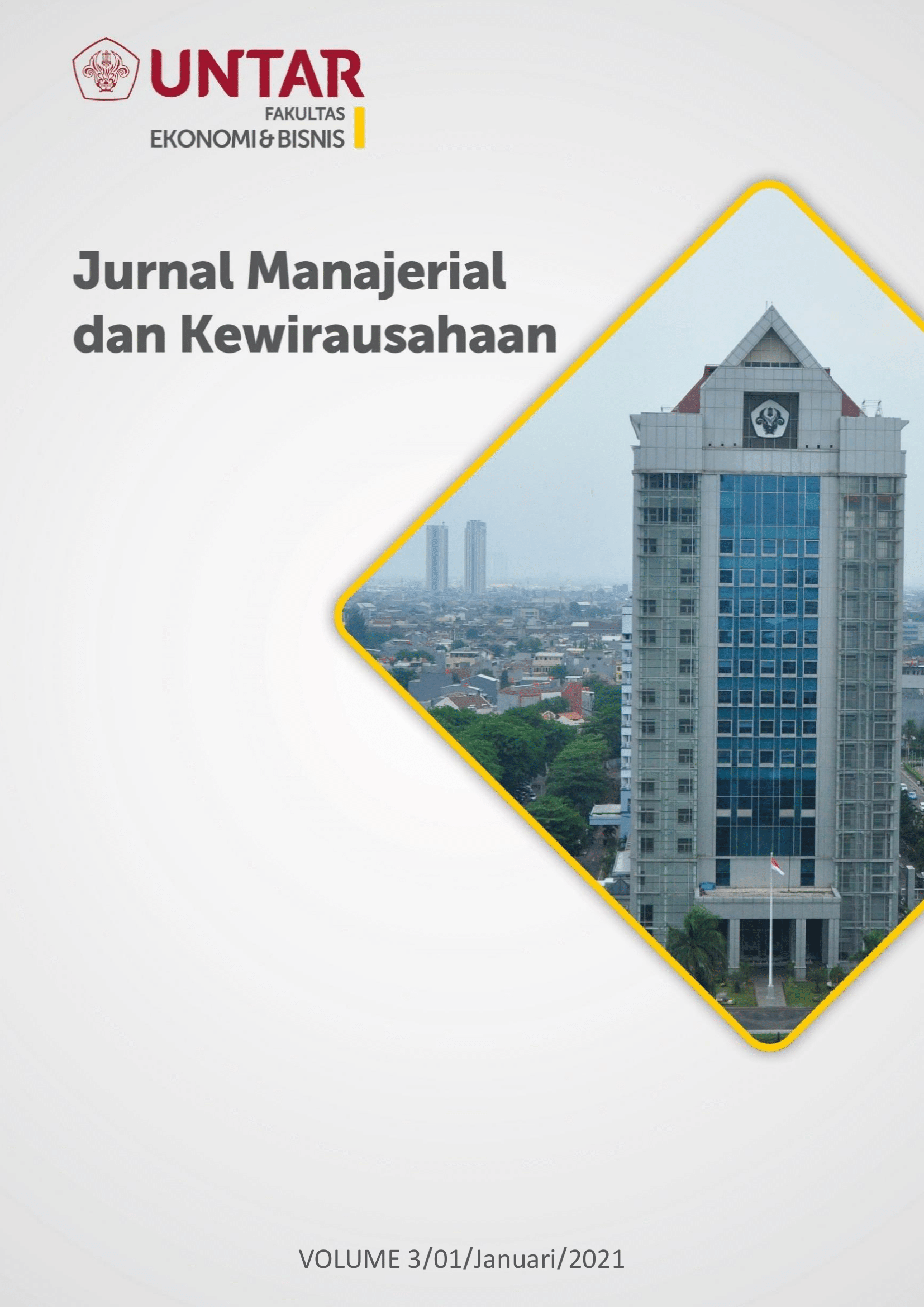Pengaruh Self Control, Financial Literacy Dan Parental Socialization Terhadap Saving Behavior
Main Article Content
Abstract
The purpose of this study is to find out about the influence of self control, financial literacy, parental socialization can affect saving behaviour. This study uses the generation Z at Jakarta as many as 219 respondents and analyzed with SmartPLS 3.2.8. Those samples are collected with google form and use convenience sampling method. The results of this study indicate that self control, financial literacy and parental socialization can affect saving behavior and all of these variable have positive relationship toward saving behaviour.
Tujuan dari penelitian ini adalah untuk mengetahui dan menganalisis pengaruh kontrol diri, literasi keuangan dan sosialisasi orang tua terhadap perilaku menabung. Penelitian ini menggunakan sampel yaitu pada generasi Z di Jakarta sebanyak 219 responden dan dianalisa dengan SmartPLS 3.2.8. Sampel diperoleh melalui google form dan pemilihan sampel yang digunakan adalah teknik convenience sampling. Hasil penelitian ini menunjukkan bahwa kontrol diri, literasi keuangan dan sosialisasi orang tua memiliki pengatruh terhadap perilaku menabung dan seluruh variabel memiliki hubungan yang positif terhadap perilaku menabung.
Article Details
This work is licensed under a Jurnal Muara Ilmu Ekonomi dan Bisnis Creative Commons Attribution-ShareAlike 4.0 International License.,/p>
References
Ajzen, I. (1991). The theory of planned behavior. Organizational Behavior and Human Decision Processes, 50(2), 179–211
Dangol, J. & Maharjan,S (2018). Parental and Peer Influence on the Saving Behavior of the Youth. International Research Journal of Management Science, 3(1), 43-63.
Fry, T.R.L., Mihajilo, S., Russel, R, & Brooks, R. (2008). The factors influencing saving in a matched savings program: Goals, knowledge of payment instruments, and other behaviour. Journal of Family and Economic Issues, volume 29, pp 234-250.
Gerhard, P., Gladstone, J.J., Hoffmann A.O.I. (2018). Psychological Charateristics and Household Savings Behavior: The Importance of Accounting for Latent Heterogeneity. Journal of Economic Behavior and Organization, 148, 66-82.
Sekaran, U., & Bougie, R. (2013). Research Method For Business: A Skill-Building Approach (6th Ed). West Sussex, United Kingdom: John Wiley & Sons Ltd.
Silaen, Sofar. (2014). Metodologi Penelitian Sosial Untuk Penulisan Skripsi dan Tesis. Bogor: In Media
Sirine, H., & Utami, D. S. (2016). Faktor-faktor yang Mempengaruhi Perilaku Menabung di Kalangan Mahasiswa. Jurnal Ekonomi dan Bisnis , 19 (1). 27-52.
Tharanika, K., & Andrew, A. (2017). Factors Influencing On Saving Behaviour Among University Students. International Journal of Research , 4 (14). 861-871.
Thung, C. M., Kai, C. Y., Nie, F. S., Chiun, L. W., & Tsen, T. C. (2012). Determinants of Saving Behavior among The University Students in Malaysia.
Warneryd, K.-E. (1999). The psychology of saving: A study on economic psychology.
Cheltenham, UK: Edward Elgar Wulandari, D. A. & Susanti. (2019). Pengaruh Literasi Keuangan, Inklusi Keuangan, Uang Saku, dan Teman Sebaya Terhadap Perilaku Menabung Mahasiswa Pendidikan Akuntansi Fakultas Ekonomi Universitas Negeri Surabaya. Jurnal Pendidikan Akuntansi , 07 (2). 263- 268.


